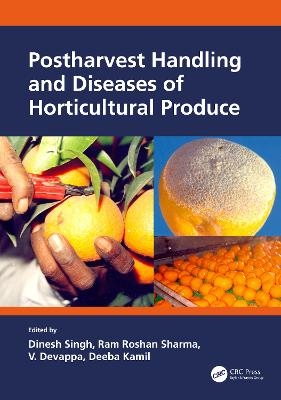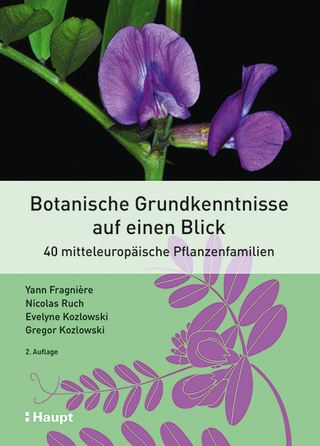
Postharvest Handling and Diseases of Horticultural Produce
CRC Press (Verlag)
978-0-367-49289-2 (ISBN)
Postharvest Handling and Diseases of Horticultural Produce describes all the postharvest techniques, handling, pre-cooling, postharvest treatment, edible coating and storage of the horticultural produce available to handle perishable horticultural food commodities, covering the areas of horticulture, agricultural process engineering, postharvest technology, plant pathology and microbiology. Postharvest diseases of major fruits and vegetables, with their causal agents, are described. The integrative strategies for management of postharvest diseases include effectively inhibiting the growth of pathogens, enhancing the resistance of hosts and improving environmental conditions, with results that are favourable to the host and unfavourable to the pathogen growth, including biotechnological approaches. Adopting a thematic style, chapters are organized by type of treatment, with sections devoted to postharvest risk factors and their amelioration. The chapters are written by experts in the fields of plant pathology, horticulture, food science, etc. Core insights into identifying and utilizing appropriate postharvest options for minimizing postharvest losses and enhancing benefits to end-users are also provided.
Features
Presents the most recent developments in the field of postharvest handling technologies and diseases in a single volume
Includes postharvest diseases of cut flowers, fruits, vegetables and tuber crops.
Appropriate for students, researchers and professionals
Written by experts and can be used as a reference resource
Dr. Dinesh Singh (Principal Scientist), ICAR- IARI, New Delhi did his M. SC (Ag) and Ph. D. from Institute of Agricultural Sciences, BHU, Varanasi. He joined ARS services in January 1997 at IIVR, Varanasi and presently working as Principal Scientist at Division of Plant Pathology, ICAR- IARI, New Delhi. Dr. Singh has made significant contribution broadly in area of Plant Bacteriology and post harvest disease management. Dr. Singh has made significant contribution broadly in area of Plant Bacteriology. He characterized and deposited 176 isolates of Ralstonia solanacerarum, 217 isolates of Xanthomonas campestris pv. campestris, 6 isolates of X. oryzae pv. oryzae, 31 isolates of X. vesicatoria, 45 isolates of Bacillus spp. (B. subtilis, B. amyloliquifaciens, B. pumilus, B. cereus in the ITCC, Division of Plant Pathology, IARI, New Delhi. He developed multiplex - PCR based sensitive, specific and reliable protocol for simultaneous detection of R. solanacearum and Erwinia carotovora subsp. carotovora from potato tubers. He characterized two races of Ralstonia solanacerarum (Race 1 and race 3) and 3 races of X. campestris pv. campestris ( race 1, 4 & 6) from India. He developed talc based formulation of bacterial antagonists such as Pseudomonas flourescens DTPF-3, Bacillus subtilis DTBS-5 and Bacillus amyloliquefaciens DTBA-11 effective against fungal, bacterial diseases of plants. He has guided 4 Ph. D and 2 M. Sc. students in the field of plant bacteriology. He has published 122 research papers in pear reviewed reputed journals, 44 popular articles, 20 books, 79 book chapters, 5 technical bulletins, 8 training manuals and 2 practical manuals. He has been honoured and awards such as NESA Fellowship, NABS Fellow, IPS Fellow, SPPS Fellow, Bioved Fellowship Award, Honorary Fellowship Indian Mycological Society (FIMS) (2020), Dr. M. M. Alam Medal, Young Scientist Associate Award, Late shri P. P. Shinghal Memorial Award, J. P. Varma Memorial lecture Award, Reviewer Excellence Award, Award for Excellent in Research, Distinguished Scientist in Plant Pathology Award, Best Faculty Award from various professional societies and agencies. Dr. R.R. Sharma born on 14th March, 1962 in Hamirpur (H.P.), Dr. Sharma completed his graduation (B.Sc. Agril.) from HPKV, Palampur and Masters in Horticulture (M.Sc.) from IARI, New Delhi. At present, he is working as Principal Scientist in the Division of Food Science and Postharvest Technology, ICAR-Indian Agricultural Research Institute, New Delhi, India. He has developed eight varieties of mango and standardized several production and postharvest management technologies for different fruits including apple, mango, pomegranate, plum, kiwifruit, litchi and Kinnow mandarin. He has worked as International Mango Registrar of International Society for Horticultural Science for 5 years (1999-2004). He is Fellow of four National Academies such as National Academy of Agricultural Science, national Academy of Biological Science, Indian Academy of Horticultural Science, and National Environment Science Academy. He is recipient of Rajiv Gandhi award and Education award of Govt of India, Dr. Rajinder Prasad award of ICAR twice ( 2004 and 2010), IARI Beast teacher award, Dr R.N. Singh award of IARI, New Delhi twice ( 2004 and 2019). He is prolific writer and has authored 14 books on different aspects of fruit production and postharvest management, and published more than 180 research papers in journals of international and national repute. He is a member, Editorial Board of more than dozen International journals, and reviewer for more than 15 International and national journal. His Google Scholar Citation is more than 3500 with h-index of 29 and h-10 index of 70. Dr. V. Devappa born on 22nd September 1970 and obtained his bachelor’s and master’s degree from the University of Agricultural Sciences, Bangalore and Ph.D from University of Agricultural Sciences, Dharwad. He joined University of Agricultural Sciences, Dharwad during 1997 as Assistant Professor. Presently he is working as Professor & Head, Dept. of Plant Pathology, College of Horticulture, GKVK, Bengaluru since 27th May 2013 to till date. He is well known for his contributions on integrated disease management of vegetable and fruit crops and biological control of soil borne plant pathogens. He played a key role in developing 20 technologies in the field of Plant Pathology and these technologies are incorporated in the package of Practices for horticulture crops in Karnataka. He has 75 publications besides 3 books and 10 book chapters. Organized National level symposium on Climate Change and conducted 2 ICAR short courses on biological control and two workshops pertaining to horticulture crop disease management. He also served as a member in the editorial boards for six online journals. He has guided 4 Ph. D and 10 M.Sc students. He also visited different countries like Israel, Spain, Malaysia, Singapore, Thailand etc. for scientific assignments and bagged more than 10 awards for his achievement’s in the field of Plant Pathology including different scientific societies. He is life member for more than ten scientific societies viz., Indian Phytopathological Society, Indian Society of Plant Protection Association, Karnataka Journal of Farm Sciences etc. Dr Deeba Kamil born on 10th September, 1981 in Lucknow (U.P.), Dr. Kamil completed her graduation from Lucknow University, Lucknow and Masters in Agriculture (M.Sc.) from AAIDU, Naini, Allahabad and Ph.D. from Banaras Hindu University, Varanasi. At present, she is working as Senior Scientist in the Division of Plant Pathology, ICAR-Indian Agricultural Research Institute, New Delhi, India. She has made excellent contribution in plant pathological research. She has involved in the field of mycology especially fungal taxonomy and associated with Indian Type Cultute Collection and Herbarium Cryptogamme Indae Orientalis. She has also started the DNA barcoding of fungal cultures with Genus Fusarium. This was the first attempt from Fusarium barcoding from India. DNA barcoding of Trichoderma, Colletotrichum, Drechslera, Phoma, Aspergillus and Penicillium is also done. She was successful to develop molecular marker for many Trichoderma and Aspergillus species. She is being working on the delineation of different Fusarium species complex. She has also tried to produce silver nanoparticies by using different fungi and worked on their bio-efficacy against Plant Pathogens. She is recipient of MK Patel young scientist award, Women scientist awards and many more societies’ awards. She has authored 4 books on different aspects of plant pathology, and published more than 50 research papers in journals of international and national repute. She is reviewer for many International and national journal.
1. Postharvest Losses of Horticultural Produce. 2. Postharvest Losses of Horticultural Produce. 3. Postharvest Handling of Fruits and Vegetables for Disease Management. 4. Postharvest Treatments for Horticultural Produce. 5. Management of Postharvest Diseases of Fruits and Vegetables through Chemicals. 6. Biocontrol of Postharvest Pathogens Affecting Perishable Horticultural Commodities. 7. Endophytes for Postharvest Disease Management in Vegetables and Fruits. 8. Management of Postharvest Diseases of Fruits and Vegetables through Yeasts. 9. Management of Postharvest Diseases in Fruits and Vegetables Using Botanicals. 10. Edible Coatings for Quality and Disease Management of Fruits and Vegetables. 11. Mycotoxins and Their Impacts on Human, Plant and Animal Health. 12. Characterization and Detection of Mycotoxins from Fruits and Vegetables. 13. Application and Monitoring of Health Hazard and Codex Alimentation for Product and Commodity. 14. Recent Advances in Postharvest Handling and Management of Citrus Diseases. 15. Postharvest Diseases of Mango and Their Management. 16. Postharvest Diseases of Banana and Their Management. 17. Postharvest Diseases of Grapes and Their Management. 18. Postharvest Diseases of Guava (Psidium guajava L.) and Their Management. 19. Postharvest Diseases of Litchi and Their Management. 20. Postharvest Diseases of Papaya and Their Management. 21. Management Postharvest Diseases of Peach Fruits and Their Management. 22. Postharvest Fungal Diseases in Stone Fruits and Their Management. 23. Postharvest Diseases and Disorders of Apple: Perspectives for Integrated Management. 24. Postharvest Diseases of Strawberry and Their Management. 25. Postharvest Diseases of Pineapple and Their Management. 26. Postharvest Diseases of Minor Fruits and Their Management. 27. Postharvest Diseases of Potato and Their Management. 28. Postharvest Diseases of Tomato and Their Management. 29. Postharvest Diseases of Capsicum sp. and Brinjal and Their Management. 30. Recent Advances in the Management of Postharvest Diseases of Onion and Garlic. 31. Postharvest Diseases of Cucurbitaceous Fruits and Their Management. 32. Postharvest Diseases of Cole Crops and Their Management. 33. Postharvest Diseases of Leguminous Vegetable Crops and Their Management. 34. Postharvest Diseases of Tropical Tuber Crops and Their Management. 35. Postharvest Handling and Disease Management of Cut Flowers.
| Erscheinungsdatum | 04.06.2021 |
|---|---|
| Zusatzinfo | 57 Tables, black and white; 7 Line drawings, color; 5 Line drawings, black and white; 95 Halftones, color; 101 Illustrations, color; 6 Illustrations, black and white |
| Verlagsort | London |
| Sprache | englisch |
| Maße | 210 x 280 mm |
| Gewicht | 1000 g |
| Themenwelt | Naturwissenschaften ► Biologie ► Botanik |
| Technik ► Umwelttechnik / Biotechnologie | |
| Weitere Fachgebiete ► Land- / Forstwirtschaft / Fischerei | |
| ISBN-10 | 0-367-49289-X / 036749289X |
| ISBN-13 | 978-0-367-49289-2 / 9780367492892 |
| Zustand | Neuware |
| Informationen gemäß Produktsicherheitsverordnung (GPSR) | |
| Haben Sie eine Frage zum Produkt? |
aus dem Bereich


